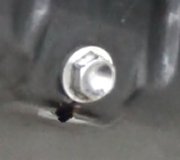As fuel consumption increased about 20% since last summer, last week I replaced the oxygen sensor.
That didn't affect the problem much, but after a couple of days, #1 cylinder went dead at idle.
The car runs noticeably rough up to about 2000 RPM where it seems to even out and produce reasonably good power.
The plugs were old and I immediately changed them, but that had no effect on the miss.
#1 cylinder is dead at low speeds, even when spark wires are exchanged between #1 and #2.
The same problem persisted when I substituted the original distributor cap, which I had previously replaced due to a crack causing misfiring in wet weather.
There had never before been a discreet miss problem associated with this cap in dry conditions.
Over the past few months, I had begun to suspect a valve problem was developing due to a few backfires when the car accelerated from a stop from upward inclines during warmup.
This has occured about 5 times since early winter.
Today, I checked compression on #1.
The first surge of the gauge yielded a reading of about 150psi.
Brief cranking brought the reading to 174psi.
I removed the valve cover and everything seemed to be in order.
The valve lash, which I had adjusted last summer, was comparable between #1 and the other cylinders.
The cam lobes looked fine and the valves and springs all appeared to be working normally.
I'm wondering what else might account for one cylinder dropping out under the circumstances I've described?
Thanks.
Dale Myers
Friday, February 29th, 2008 AT 5:28 PM


